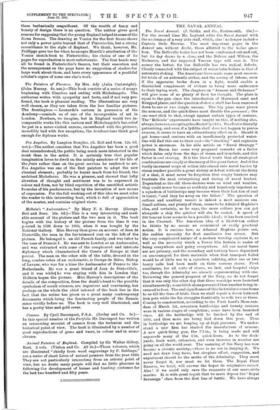THE NAVAL ANNUAL.
The Naval Annual. (J. Griffin and Co., Portsmouth. 15s.)— For the second time Mr. Leyland edits the Naval deflect/ with the as;istance of a very able staff, which, alas ! no longer includes Captain Orde Browne. The most important pages in the Annual are, without doubt, those allotted to the boiler ques- tion. The Belleville boiler has not been condemned out and out, but its day draws to a close, and the Babeox and Wilcox, the Niclausse, and the improved Yarrow type will oust it. The sooner the better, for the Belleville has two radical defects. Closely connected with the subject of water-tube boilers is that of automatic stoking. The Americans have made some most success- ful trials of an automatic stoker, and the saving of labour, even if the apparatus broke down in a fight, would enable a diminished complement of stokers to bring more endurance to their trying work. The chapters on "Armour and Ordnance" will give some of us plenty of food for thought. The plate is equal to the gun since the introduction of Harveyed steel and %rapped plates, and the question of shot v. shell has been narrowed down to one or two simple axioms. The big guns must pierce the armour, and the quick-firers must disable the personnel ; the one must stick to shot, except against certain types of cruisers. The Belleisle' experiments have taught us this, if nothing else, always, however, exceptin g the effect of lyd dite. Its effect is literally pulverising, and even if a lyddite shell does not happen to pierce armour, it seems to have an extraordinary effect on it. Should it get home—and cruisers with an insufficiently protected water- line will find this out to their cost—its " shocking " and explosive power is enormous. In his able article on "Naval Strategy" Captain Bacon has some very pregnant remarks on a factor which dates only from the days of steam and ironclads, and this factor is coal strategy. It is the literal truth that all strategical combinations are simply at the mercy of this giant factor. And if the vastly increased scope of action introduced into naval tactics by steam renders possible a great victory or defeat without the firing of a shot, it must never be forgotten that empty bunkers may frustrate the most enterprising and daring of naval leaders. Dependent as the old three-deckers were on wind and weather, they could never become so suddenly and hopelessly impotent as a squadron of battleships may become when their last ton of coal is burnt, "and they far away on the billow." The question of colliers and auxiliary vessels is indeed a. most anxious one Small colliers, and plenty of them, seems to be Admiral Hopkins's idea, and certainly, as he says, the more colliers you can get alongside a ship the quicker will she be coaled. A speed of 200 tons an hour seems to be a possible ideal; it has been reached in the Channel. The American idea of a 15,090-ton collier he thinks by no means an economical or really practical notion. It is curious how, as Admiral Hopkins points out, the sudden necessity for fleet auxiliaries has arisen. But the very complicated nature of a modern warship explains it, as well as the necessity which a Power like Britain is under of being everywhere and going everywhere. All our naval bases are not primary, and the secondary and tertiary bases dependent on sea-transport for their materials when that transport failed would be of little use to a squadron refitting, after one or two heavy calls had been made on their various stores. Fleet auxiliaries, for all sorts of stores, we lack, and hospital ships too, though the Admiralty are already experimenting with one. Reviewing the general progress of the Navy, we do not forget that it was only the other day that three warships were launched simultaneously; some hitch alone prevented that number being in- crewed to four. The real significance of this fact will not come home to us till the time of trial; then we shall repair a dozen battered iron pots while the foe struggles frantically to refit two or three. Coming to construction, according to the First Lord's Memoran- dum of March 1st, seventeen battleships and twenty cruisers were in various stages of completion; some have been launched since. All the battleships will be finished by the end of 1903, and then more are being laid down this year. Thus in battleships we are keeping up at high pressure. We under- stand a new firm has started the manufacture of armour. A new quick-firing gun, the 7.5 in., is being made and will supersede many of the Gin, quick-firers. As to the dock- yards, fresh work, extension, and even increase in number are going on all the world over. The manning of the Navy has now become a chronic anxiety,—there is no use in denying it. We need not draw long faces, but sleepless effort, suggestion, and experiment should be the motto of the Admiralty. They must never forget it, nor must we let them. The Royal Fleet Reserve, we trust, will answer the hopes its originators raised. Alas ! if we could only save the remnants of our mercantile marine. It is with great regret that we must depose the Royal sovereign' class from the first line of battle. We have always
bad a great admiration for them as ships, but when it becomes obvious that an armoured cruiser would knock them to pieces, and that even if rearmed and rearmonred they would be too slow, the decision must be irrevocable,—they must go.





















































 Previous page
Previous page